Human Rights Council 53rd Session
19th June – 14th July 2023
Report of the Special Rapporteur on the independence of judges and lawyers
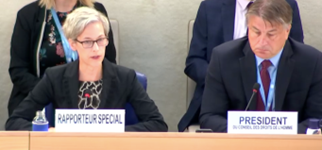
By Tamir Boldbaatar / GICJ
Executive summary
The full enjoyment of human rights depends on the availability of an independent judiciary, declared the Special Rapporteur on the Independence of Judges and Lawyers, Margaret Satterthwaite at the 11th Meeting of the 53rd Session of Human Rights Council in June 2023. The Special Rapporteur was deeply concerned with increasing and widespread efforts to target lawyers for their work. States have an obligation to ensure lawyers are able to play leading roles in defending human rights. However, lawyers increasingly face threats, arrest, prosecution, imprisonment and even death as result of performing their duties. This is especially true for lawyers who are active in the defence of human rights, women’s rights, minority groups, refugees and migrants. Such targeting violates the rights of lawyers, but also affects the rights of other individuals to a fair trial.
Report of the Special Rapporteur
The judiciary was one of the key institutions that safeguarded the rule of law. Judicial independence is a key safeguard against rising authoritarianism and an essential element in guaranteeing justice systems are fit for purpose. It requires attention to the structure of the State and the separation of powers. Judicial independence is also key to safeguarding economic, social and cultural rights, as well as the rights of migrant workers. Similarly, rights and obligations relating to the prohibition on torture clearly require judicial independence.
Independent judges guaranteed that the same laws were applied to everyone. Protecting the independence of lawyers and judges was a vital means of shoring up rights-promoting systems. Protection also ensured that individual rights claims received a fair hearing for the realisation of human rights and justice, thus safeguarding against rising authoritarianism. Nobody is above the law. Special rapporteur highlighted that States also needed to ensure that they did not undermine the independence of individual judges. Allegations of high-profile criminal cases, such as corruption and grave human rights violations, were brought against judges and prosecutors. Human rights should be protected by the rule of law. Special rapporteur, Ms. Sattherthwaite advocated for States to create trusting relationships between the judiciary and the people they served. As a result people need to be able to trust that judges and lawyers are working to promote human rights.
Ms. Satterthwaite shared concerns over the cases of Judge Miguel Angel Gálvez and Prosecutor Virginia Laparra in Guatemala. Judge Tarek Bitar in Lebanon had also faced obstacles in attempting to carry forward the investigation into the Beirut port blast and allegations of more systematic intrusions into the independence of the judiciary in Tunisia. She had previously written to Israel regarding proposed legislative changes that would seriously undermine the independence of courts, to Sri Lanka noting that anti-terrorist legislation did not have effective judicial oversight, and to China mentioning the impact of the ordinance on the legal profession and the banning of foreign lawyers for the Hong Kong Special Administrative Region. She called on El Salvador to amend the Penal Code on gang violence, and allegations of serious restrictions to due process guarantees for those detained.
In her next report to the General Assembly, the Special Rapporteur committed to assess legal empowerment as a strategy for people-centred justice. Moreover, she assured that she would examine autocratisation and its impact on the freedom of the judiciary in a future report. Judicial independence, she stated, is the key to safeguarding economic, social and cultural rights, as well as the rights of migrant workers.
Similarly, rights and obligations relating to the prohibition on torture clearly require judicial independence and its absence raises serious concern about accountability.
Interactive dialogue
The majority of speakers highlighted how the sharing of good practices has allowed courts to combat disinformation, making processes more transparent and guaranteeing access to information. They also expressed their pleasure on access to justice as well as emerging challenges and threats to the independence and integrity of the judiciary and human rights lawyers. The Special Rapporteur’s advice on how to best address the impact of the climate crisis on judicial investigations was appreciated.
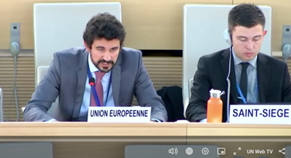
The EU specified an independent and impartial judiciary, an independent legal profession and an objective and impartial prosecution. The integrity of the judicial system was fundamental for the protection of human rights and was one of the foundational building blocks of democratic societies. Accessible and effective legal aid was an essential element of a fair, humane and efficient system of administration of justice that was based on the rule of law.
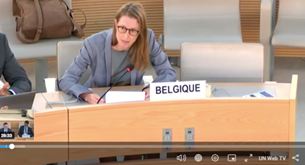
Belgium spoke of challenges, such as the risk of judicial capture, and threats on lawyers both online and offline. The challenges to judicial independence linked to digital technologies, especially disinformation, online harassment and threats, and artificial intelligence. The false information disseminated intentionally to cause serious social harm. The independence of the judiciary was a key element for a democratic State that valued the exercise and rule of law.
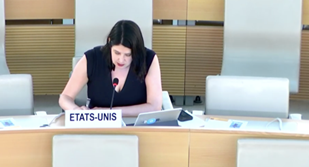
The USA rejected efforts to prevent women from serving as judges and lawyers in Afghanistan and condemned the application of the Hong Kong National Security Law as incompatible with relevant provisions under the ICCPR and the UDHR. Additionally, it highlighted the concern about Tunisia’s judicial independence, including the dismissal of 57 judges in June of 2022. The delegate from the USA set out that States must preserve the independence of lawyers, and must not punish lawyers simply for defending civil society activists. They concluded that an impartial and independent judiciary is a cornerstone of any democracy.
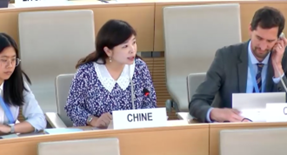 The delegate of China delivered a statement setting out justifications for their National Security Law aimed at preserving the rule of law which was promulgated in an attempt to restore order to the justice system in Hong Kong. The delegate claimed that this stability means that Hong Kong can now conduct trials independently without any interference. The independence of judges and lawyers plays an important role in the judicial protection of human rights and China restated their commitment to making every citizen enjoy fairness and justice in judicial cases. China expressed their support for the the United Nations human rights mechanisms and urged them to work in this field in a fair and objective manner.
The delegate of China delivered a statement setting out justifications for their National Security Law aimed at preserving the rule of law which was promulgated in an attempt to restore order to the justice system in Hong Kong. The delegate claimed that this stability means that Hong Kong can now conduct trials independently without any interference. The independence of judges and lawyers plays an important role in the judicial protection of human rights and China restated their commitment to making every citizen enjoy fairness and justice in judicial cases. China expressed their support for the the United Nations human rights mechanisms and urged them to work in this field in a fair and objective manner.
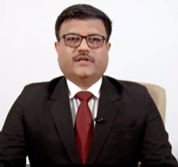 The independence of judiciary in India is one of the basic structures of the Constitution, enshrined in Article 50. It separates the judiciary from the executive in public services of the State and is essential for an independent and impartial judiciary. The global understanding is that the role of a judge in a democracy is meaningful only if the judge is independent and impartial. The Indian Bar is independent under the Advocates Act. It is governed by a head Statutory body, the Bar Council of India, which is not under the administrative control of the Court or the Government. NHRC India has constituted a Core Group on Criminal Justice System, consisting of various stakeholders. The Core Group deliberates upon the justice delivery system and recommends several measures for protecting and preserving justice, liberty and equality of the citizen.
The independence of judiciary in India is one of the basic structures of the Constitution, enshrined in Article 50. It separates the judiciary from the executive in public services of the State and is essential for an independent and impartial judiciary. The global understanding is that the role of a judge in a democracy is meaningful only if the judge is independent and impartial. The Indian Bar is independent under the Advocates Act. It is governed by a head Statutory body, the Bar Council of India, which is not under the administrative control of the Court or the Government. NHRC India has constituted a Core Group on Criminal Justice System, consisting of various stakeholders. The Core Group deliberates upon the justice delivery system and recommends several measures for protecting and preserving justice, liberty and equality of the citizen.
The International Development Law Organization (IDLO) appreciated the Special Rapporteur highlighting the roles that actors across the justice sector play in ensuring that the rule of law and access to justice enable everyone in society to enjoy the full range of human rights. IDLO works with government officials, customary and informal justice actors, paralegals, civil society, individuals and communities to improve the fair, equal and delivery of justice for all. They expressed that their experience in the field has taught them that an inclusive “legal ecosystem” is critical not only to advance human rights, but also to promote peace and sustainable development.
Concluding remarks
The Special Rapporteur on the independence of judges and lawyers sets out the need for a reimagining of access to justice and the rule of law from the diverse perspectives of those who bear the brunt of deep inequalities, systematic discrimination and persistent marginalisation. An independent judiciary can play a critical role in protecting rights in the face of autocratisation and resisting democratic decline. International human rights law requires that States create independent and impartial legal systems that guarantee that no one is above the law, no one is outside the protection of the law and no one is excluded or harmed by the law.
Position of Geneva International Centre for Justice
Geneva International Centre for Justice (GICJ) also demands the guarantee that those who practise law are able to do so free of harassment, and urges States to strengthen legal schemes. The judiciary should reflect the society it served. Diversity in judges enriched their jurisprudence. GICJ emphasises the need to increase diversity which extends to persons with disabilities and indigenous peoples among other groups. Mass movements around the world are calling on the judiciary to do more to respond to racism and other discrimination issues. The domestic legislation on national security and counter-terror laws silenced lawyers, preventing effective legal defence and access to justice. All States should respect human rights commitments under national legislation and international treaties. An independent international mechanism needs to be established in order to ensure that justice prevails. GICJ highly supports the creation of trusting relationships between the judiciary and the people they serve.
Geneva, Geneva4justice, GICJ, judges, lawyers, independence, defence_human_rights, humanrightsdefenders, justice







